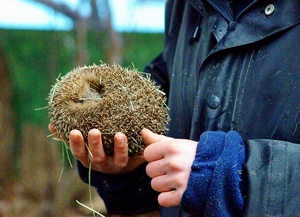CDC says pet hedgehogs are behind recent Salmonella outbreak in Michigan and other states

Flickr phot by Peter G. Trimming
The considerations and care of pocket pets differ as well, and one species has been cause for alarm as of late because of that.
The Centers for Disease Control indicates that in the last year, 20 people have been infected by a rare but dangerous form of salmonella bacteria, Salmonella Typhimurium, and investigators say the illnesses were linked to contact with pet hedgehogs, including some in Michigan.
One person died.
Other animals that are more commonly known to carry the pathogen are frogs, toads, turtles, snakes, lizards — even chicks and ducklings.
Although any hedgehog can carry salmonella, the African Pygmy has been most often cited as being a common thread in the majority of cases reported.
Hand washing is a crucial practice that needs to be used by everyone that has contact with animals of any kind, and here are a few rules of thumb to prevent illness:
Click here to read more from the CDC website about the matter.
Lorrie Shaw leads the pets section for AnnArbor.com. You can follow her daily pet adventures on Twitter and subscribe to AnnArbor.com's email newsletters.


Comments
Elaine F. Owsley
Sun, Feb 3, 2013 : 12:50 p.m.
Maybe the headline should say "Pet Hedgehogs". I had a hard time visualizing hedgehogs running around here, but was happy to see it was just pet ones. First pumas, then deer and then hedgehogs was too much.
Goober
Sun, Feb 3, 2013 : 12:01 p.m.
My, my, my! Hazardous pet food. Go figure!
Itchy
Sun, Feb 3, 2013 : 2:23 p.m.
I agree with you Goober - go figure!
DBH
Sun, Feb 3, 2013 : 1:24 p.m.
What do you mean by "Go figure!"? You include it at the end of most of your comments. Is it really such a near-universally applicable addition?
JJ
Sun, Feb 3, 2013 : 11:56 a.m.
So What is this dude holding, a ball of turf?